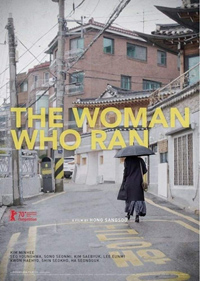Rendezvous in Seoul: Sang-soo Gets Spare in Conversational Triptych
 Ending a rare year-long absence from the cinema (an observation of note since he presents two to three new projects a year), South Korean auteur Hong Sang-soo returns with his twenty-fourth feature The Woman Who Ran, which he presents as another showcase for muse Kim Min-hee. Arguably on the spare side of his filmography at a brief seventy-seven-minute running time, which consists of several long takes and fanciful, sometimes frivolous discussions one woman has with three women from her past, some definite highlights should woo his staunch enthusiasts as well as surprise newcomers with an effortless energy still reminiscent of Rohmer (whom he’s most often, perhaps inextricably, compared to) albeit with more hint of enigma than usual.
Ending a rare year-long absence from the cinema (an observation of note since he presents two to three new projects a year), South Korean auteur Hong Sang-soo returns with his twenty-fourth feature The Woman Who Ran, which he presents as another showcase for muse Kim Min-hee. Arguably on the spare side of his filmography at a brief seventy-seven-minute running time, which consists of several long takes and fanciful, sometimes frivolous discussions one woman has with three women from her past, some definite highlights should woo his staunch enthusiasts as well as surprise newcomers with an effortless energy still reminiscent of Rohmer (whom he’s most often, perhaps inextricably, compared to) albeit with more hint of enigma than usual.
Sang-soo sets up a series of juxtapositions across these three lengthy conversations, carnivore vs. vegetarian, the importance of animals vs. humans, divorced vs. married, and whether or not a successful loving relationship means time apart or constant daily involvement.
Perhaps the key is the mysterious title in this take about Gam-hee (Min-here), who travels to visit old friends on the outskirts of Seoul while her husband is away on business. True, there is the figment of a woman who ran away, a neighbor lady of Young-soon (Seo Young-hwa, Right Now, Wrong Then) who abandoned her husband and adult daughter in the middle of the night, the emotional effects which seem to have been substantial. But Gam-hee repeats her own personal narrative to these three women, with varying degrees of introduction, even inconsistency. Perhaps she is ‘the woman who ran,’ and in this case, ran back to her past life to see what to make of her present.
Sang-soo makes excellent use of polite objections between characters with various back-tracking of contradictory faux pas as these women attempt to be congenial or supportive to their old acquaintance. The zenith of the film’s comic energy comes when a new neighbor of Young-soon demands she and her roommate stop feeding the stray cats in the neighbor due to his wife’s fear of them—the result is a delightful dance of polite insistence of the need to feed the strays they view as children, resulting in one of the best zooms of Sang-soo’s significant filmography.
But the tone gets more serious as the film progresses when Gam-hee visits Su-young (Song Seon-mi, On the Beach at Night Alone), a single woman who reveals a dalliance with a neighbor (and perhaps more of a penchant for the local bar than she’d like anyone to realize) when a younger lover shows up to spark her ire. And lastly, we receive the most insight about Gam-hee from an accidental meeting with Woo-jin (Kim Sae-Byuk, a new face in the Song-soo stable), who works at a cinema and we gather had a detrimental effect on Gam-hee’s relationship with an older writer/director (Kwon Hae-hyo, one of Sang-soo’s regular cads who shows up briefly).
Ultimately a conglomeration of Sang-soo’s favorite motifs, but perhaps once more with the fitful melancholy of One the Beach at Night Alone, he hits upon the usual critiques of his life and work. Just as Gam-hee repeats herself on the nature of her five-year marriage, we get the sense perhaps she doesn’t quite believe what she’s saying, but also suggests the comfort of repetition, which can be seen as way to assuage difficult personal transition. But it’s something that also allows for the ability to tweak and maybe even reinvent the parts of our narratives which have become obsolete.
Reviewed on February 25th at the Berlin International Film Festival – In Competition. 77 Mins.
★★★/☆☆☆☆☆


